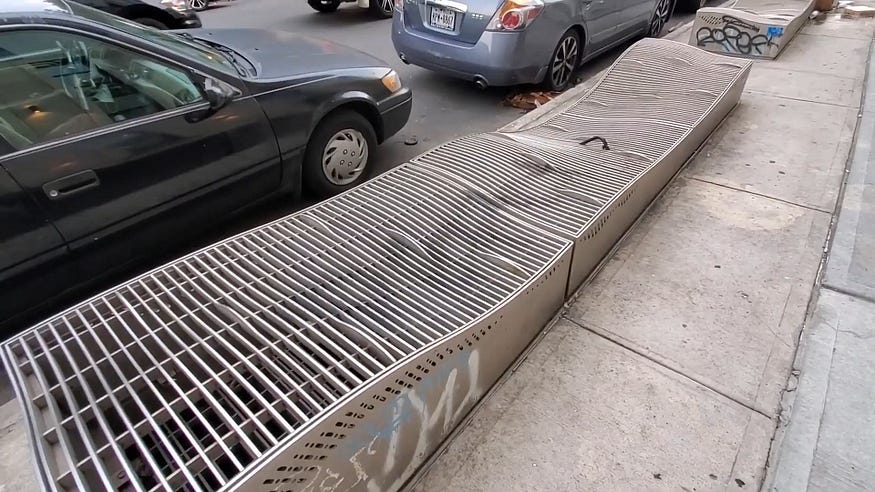Homelessness is the Best Scam Since Enron
Oh for f*cks sake
Here’s the thing—classical music isn't as repetitive as most music people listen to, so it’s harder to zone out while it’s playing.
That’s why you’d use it on the homeless.
If only someone had told Beethoven, in the future, your symphonies will be used as a homeless deterrent. The state of the modern world.
This might not surprise you, but in the last ten years, Los Angeles and New York City have doubled the number of homeless people.
This includes 183,312 homeless kids in California and 21,805 in New York City.
And here’s the big city catch: New York has a budget of $26,000 per homeless person (totaling $2.4 billion) and 79,190 vacant home units, and yet the city still has a homelessness rate of over 60,000 people.
It’s worse for L.A.
I’m reluctantly accepting the reality —an unholy alliance exists between government housing agencies and their non-profit contractors.
The Homeless Industrial Complex
A cured patient is a lost customer.
It is why the rule of thumb for checking if a charity is legit is checking the CEO’s salary. Homelessness has had some ugly blemishes in years past:
CORE Service Group’s— which has a slogan “helping to eradicate homelessness” — CEO Jack A Brown III was pocketing a cool $1 million before NYC cut ties with him.
The Los Angeles Homeless Services Authority’s new CEO Dr. Adams Kellum is earning $30,000 more than the president of the United States.
Destination: Home, a tax-exempt organization that collected more than $62 million in contributions in 2020, had its CEO net $335,404 that year, and one of the directors made a hefty $754,871, of which $693,186 was “base compensation.”
Are these salaries justified?
Are our tax dollars being spent on the right people?
Maybe. A $335,404 salary isn’t out of the ballpark for a CEO of an organization of this size. The problem is when you look at the results.
Organizations like “Destination: Home” need homelessness to thrive, creating a twisted incentive system. Where other businesses strive for success, these charities thrive off their lack thereof, with $62 million in revenue and growing.
It’s like a cancer that feeds on itself.
“A lot of money is going into this place,” said Annabelle Alexander, who lived in Beach House, a shelter in Far Rockaway, Queens. “But it’s not going to us.”
New York and Los Angeles don’t want to solve their homelessness problem.
There’s too much money in it. Millions. In fact, one of the only things NYC has done to fix the crisis in years is to add “homeless-proof vents” that make anyone sleeping on them experience pain:
And before he was fired, New York Gov. Andrew Cuomo collected more than three-quarters of a million dollars in donations with ties to the shelter system.
So the next time you hear someone in government say, “We need to solve homelessness,” the odds are it isn’t the homeless they’re trying to help.
Real Solutions to the Homelessness Problem
The Biden-Harris administration recently announced their plan to reduce homelessness by 25% by 2025.
I’m skeptical, fatalistic, and quite jaded about the government’s ability to solve any problem, let alone this, but there are some real solutions out there.
Finland is the only EU country where homelessness is decreasing rather than increasing. They accomplished this with their “Housing First” campaign that emphasizes providing people with permanent housing solutions rather than temporary fixes.
If only it were that easy in the U.S.
Finland is considered one of the world’s “happiest countries,” while America is a social media and pill-addicted wasteland. (It’s not too bad!)
Solutions? Anyone?
On the one hand, Trump’s solution sounds like he wants to arrest all the homeless and force them to choose between imprisonment or living in a manufactured tent ghetto.
On the other, this could work if done correctly.
If they actually had the goal of helping people, but our government is evil and incompetent, it can only end poorly.
Trump’s idea did happen in Star Trek Deep Space 9 in the year 2024:
The bell riots
San Francisco
Sanctuary city = "sanctuary district" (give it a watch)
Mental health is also key to solving this crisis.
The homelessness problem has its roots in the deinstitutionalization of mental health facilities in the 70s. People said it was cruel to keep the mentally ill in asylums, so they kicked them out into the streets, where they couldn’t get medication, so they started treating their schizophrenia with cheap booze and PCP.
Clearly, we don’t need mental asylums like those in “Shutter Island.”
But it’s a start outside the hamster wheel of the current homeless crisis.
Will any of this be taken seriously?
Probably not. The political right will say it costs too much and the left will say it's fascism—even though it costs more to deal with homeless people in the criminal justice system than mental health centers. And that doesn’t even begin to address the cost on public and private property, quality of Life, and property value, and so on.
So, for now, spread awareness about the homeless industrial complex. And keep doing your part. It might not seem like much, but every little bit helps.
Today was supposed to be a podcast day but my repair guy in nyc STILL HASN’T REPAIRED THE DAMN THING. We fight tomorrow.






I think there’s a much, much simpler explanation: Americans have a weird sense that if someone gets something for free, they’ve lost something. Therefore, homeless policies are often riddled with catches that ensnare people. Because on a gut level, many people don’t want to solve the homelessness problem if it means giving someone something for free. They might say they do. They might bicker that homeless people are on the street. But they don’t want to pay for it up front.
They’d rather pay for it later on when the person needs health services or the police or gets locked in an asylum. Because that’s perceived as beyond their control. It’s like the most fucked up version of the Trolly Problem ever. Do you throw the switch and pay less money for a homeless person now, but you give them something for free? Or do you do nothing and get billed astronomically more money for it later, but...you can claim you didn’t have a hand in it, that it wasn’t an intentional act?
I think this perfectly suffixes to explain it. No conspiracy theories needed.
It was a confluence of agendas that sparked our homeless situation. While institutions felt dehumanizing and invalidating of patient voice, Regan was delighted to cut funding to the state hospital system. This timing set the stage for our current nightmare.